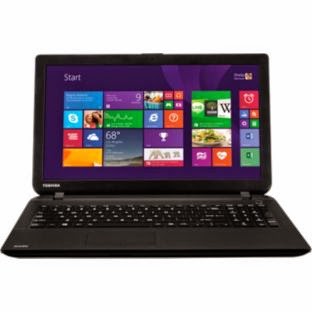My first laptop cost me £950 back in 2003, my second £800 in 2005, so I was interested to see a laptop for less than £200 on the Argos Website. Looking through the reviews, I noticed that many of them were dreadful, complaining about the mouse pointer freezing or seeming to have a mind of its own. The laptop has a low powered CPU- basically a netbook CPU- but could it really be that bad?
Towards the end of the reviews I noticed one from somebody who had contacted Toshiba and been told that the problem was a buggy touch pad driver.
PCWorld was selling a similar Toshiba for the same price but with a slightly more powerful Intel CPU. Again the same reviews complaining about sluggish performance. One reviewer said that the laptop performed well after being updated.
My old laptop only has an 80GB hard drive, and the Toshiba C50D has a 500GB hard drive. I don't do anything on my PC that requires a powerful CPU, so I wondered if the problems reviewers had identified were in fact down to software problems, and if these computers might be a bargain.
Over Easter PCWorld offered their Toshiba for £180, with a reconditioned item for £150. I was tempted but the offer disappeared before I could make my mind up. I regretted not going for it.
Then I saw the C50D-B-120 on LaptopsDirect for £150 reconditioned and snagged one. (The buggers then reduced it to £145 the next day!)
Mine was in A1 condition as stated, but yes, the mouse pointer was slow to respond and did seem to have a mind of its own.
Windows update told me that there were more than 100 updates available, but clicking the install button seemed to do nothing- downloading 0% was the constant message.
I suspect that Windows was trying to update in the background and that the manual update failed because the automatic update process had a lock on the process.
This was confirmed when I went to shutdown later and saw a "Shutdown and install updates" message.
Windows configured some updates when it was shutting down, and then configured some more when it was booting up again.
This process- background download of updates which I as the user was unaware of until prompted to install updates when shutting down- repeated several times before Windows Update confirmed that all the available updates had been installed.
Whereupon the computer now works just fine. The mouse pointer is responsive and for simple tasks like web browsing it is perfectly snappy.
Of course most computer users, especially new computer users, to whom this computer is marketed, are just going to turn the computer on and find it doesn't work.
Sorry Toshiba, you didn't really deserve the abuse heaped upon you.
For anybody looking for a really cheap laptop that does basic computing really well, yes, you can get one.
(PCWorld was offering a reconditioned C50-B for £140 at one point.)
But you may have to spend a bit of time updating the software before it will be usable.
Microsoft, you do deserve the abuse heaped upon you. Why is this process so painful?
Of course anybody who read this blog will know I am a Linux user. The Toshiba C50D-B-120 is now running Debian Jessie, dual boot with Windows 8.1 for the time being as an experiment in UEFI dual booting. This post was made from Debian with the computer performing perfectly satisfactorily.
Future posts will look at the Debian installation process and hardware issues with this computer.
But to conclude I will say that the Toshiba C50D-B-120 so far seems to be the equal or better of either of my previous machines which cost far more, at least in the tasks I put it to. The most noticeable improvement is its much greater efficiency: the power adaptor is half the size and a third of the weight of my previous laptop's adaptor and doesn't get nearly as hot: a green machine.
Thursday, April 23, 2015
Subscribe to:
Post Comments (Atom)



No comments:
Post a Comment